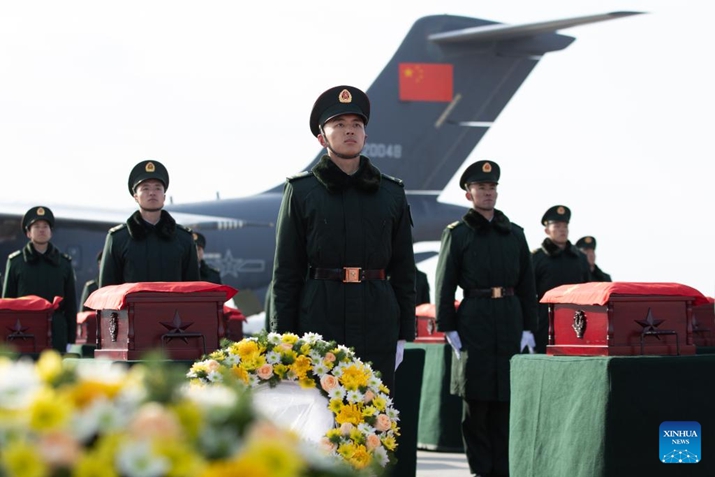| China |
| Remains of 43 Chinese martyrs in Korean War returned to homeland from ROK | |
|
|
 Soldiers escort coffins containing the remains of Chinese People's Volunteers (CPV) martyrs at the Taoxian international airport in Shenyang, northeast China's Liaoning Province, on November 28. The remains of 43 CPV soldiers who lost their lives during the War to Resist U.S. Aggression and Aid Korea (1950-1953) were returned to China on November 28 from the Republic of Korea (ROK) (XINHUA) The remains of 43 Chinese People's Volunteers (CPV) soldiers who died during the War to Resist U.S. Aggression and Aid Korea (1950-1953) were returned to China on November 28 from the Republic of Korea (ROK). At 12:07 p.m., a Chinese People's Liberation Army Air Force Y-20 transport aircraft, carrying the remains of the fallen soldiers and 495 of their personal effects, landed at Taoxian International Airport in Shenyang, capital of northeast China's Liaoning Province. The plane's touch down was met with a water cannon salute, as soldiers carried the caskets off the plane before a remembrance ceremony was held at the airport. Nearly 1,000 people, including representatives from central and local authorities, the military, war veterans, and relatives of CPV martyrs, attended the ceremony. Following the placement of the caskets, which were covered with the Five-star Red Flag, the participants bowed three times in dignified silence to the soldiers' remains. The remains will be laid to rest in a martyrs' cemetery in Shenyang. After the ROK handed over the martyrs' remains and belongings to the Chinese side in Incheon on Thursday morning, China held a memorial ceremony at Incheon International Airport. During the ceremony, the Chinese national anthem was played, and each casket was draped with the national flag. Attendees bowed three times to the martyrs before their remains were placed onto the plane. From 2014 to 2023, China and the ROK, in accordance with international laws and humanitarian principles, successfully completed 10 consecutive handovers involving the remains of 938 CPV martyrs in the ROK, along with related artifacts. The Korean War broke out in June 1950, eight months after the People's Republic of China was founded. At the request of the Democratic People's Republic of Korea, Chinese ground forces under the CPV entered the Korean Peninsula on Oct. 19, 1950. A total of 2.9 million CPV soldiers joined the war that lasted almost three years, with more than 360,000 killed or injured. Welcome home The flight from Incheon to Shenyang lasted about an hour and 20 minutes, but for many of the martyrs, this journey home spanned almost seven decades. In the past a few days the city of Shenyang has been decorated with slogans that read "welcome back, our heroes". As the Y-20 military transport aircraft prepared to land at Shenyang airport, the air traffic control tower transmitted a heartfelt message: "The mountains and rivers remain intact, our country is prosperous, and our military is strong. With the utmost respect, we welcome the loyal martyrs back home." In response, captain of the Y-20, Zhou Han, acknowledged the gravity of the moment: "The people's heroes will live on forever, their names eternally etched in history." It was freezing in Shenyang on Thursday, with temperatures dipping well below zero. Standing among the waiting crowd, retired teacher Lang Qingxia struggled to hold back her tears. In August 1952, her older brother Lang Defu died in the line of duty during the Korean War; she hopes that one day he will be brought back home and laid to rest. "I have been coming for several years," she said. "Those heroes are my brother's comrade-in-arms, whom I regard as my relatives. On the other hand, I look forward to seeing my brother among these returning home." Dong Shulan's uncle went to fight in the Korean War in July 1952, and that was the last time anyone saw or heard from him. "Even though my uncle may not be coming home this time, the return of his comrades feels like he's back too," she said. "I am deeply honored to be here," said Wang Lei, who plays Qin Jiwei, a CPV army commander, in the hit TV drama Battle of Shangganling. "As an actor, I'm here to welcome the heroes home, and it feels as though the characters I've portrayed in the past are welcoming them back as well." Winter Olympic short-track speed skating champion, Wu Dajing was visibly moved by the experience. "Many of the martyrs were younger than us when they went to war. They sacrificed their lives to protect our country. It was an environment that today's youth should never experience. I hope that their spirit can be an inspiration to today's young people." The ceremony was also livestreamed online. Among the viewers were faculty and students of a primary school in Shenyang, which was named after CPV martyr Mao Anying, the son of late Chinese chairman Mao Zedong. In memory of the martyrs, the students had selected personal gifts to take to the martyr's cemetery at a later date. "My gift is a scarf," said a girl. "The soldiers braved severe cold and fought in extremely difficult situations. So I hope that it could protect our CPV soldiers from the cold wind." Another girl cooked noodles with her mom before school that morning. In north China, it is customary to welcome guests with noodles. "These noodles taste of home," she said. "The martyrs have returned home." A third child brought a model plane. "My dad is a soldier and I grew up listening to his stories about the Korean War. I brought this model so our CPV soldiers can see how strong our motherland is now." |
|
||||||||||||||||||||||||||||
|